Employability Skills Report: Performance, Objectives, and Strategies
VerifiedAdded on 2023/02/02
|17
|5701
|26
Report
AI Summary
This report delves into the critical aspects of employability skills within the context of Travelodge Hotels Limited. It begins by outlining the importance of these skills in achieving business success, emphasizing the development of personal responsibilities and performance objectives. The report then evaluates self-effectiveness using the SMART technique and provides recommendations for improvement, focusing on communication, leadership, and time management. It explores various motivational techniques, including Theory X, Theory Y, and Maslow's hierarchy of needs, to enhance employee performance. Furthermore, the report addresses work-based issues, such as employee retention and communication gaps, and proposes solutions. It also covers team dynamics, problem-solving tools, and strategies for resolving issues related to labor turnover. Finally, it touches upon the financial and non-financial impacts of business strategies. This report serves as a valuable resource for understanding and improving employability skills in a professional setting, with a focus on practical applications within the hospitality industry.
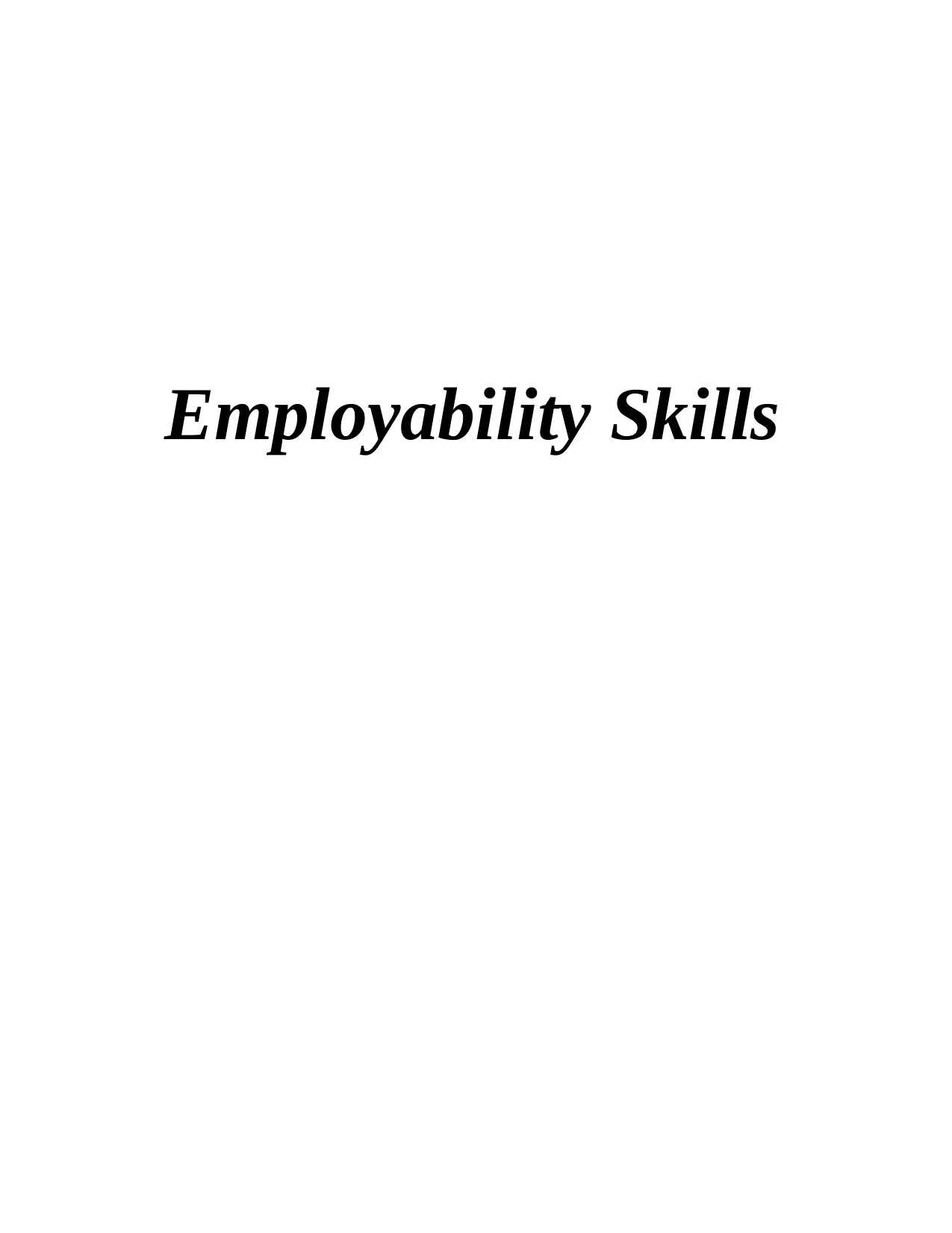
Employability Skills
Paraphrase This Document
Need a fresh take? Get an instant paraphrase of this document with our AI Paraphraser
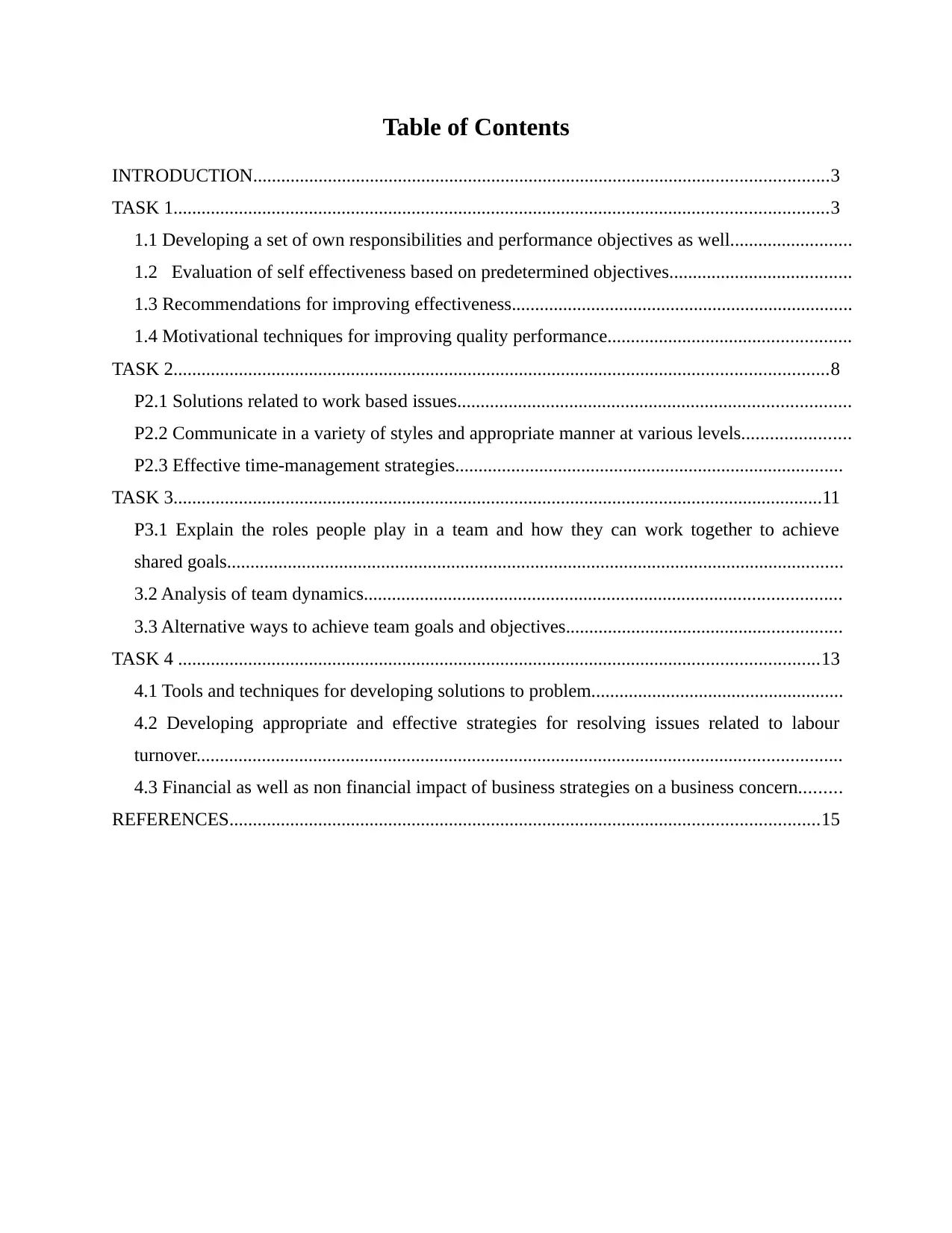
Table of Contents
INTRODUCTION...........................................................................................................................3
TASK 1............................................................................................................................................3
1.1 Developing a set of own responsibilities and performance objectives as well..........................
1.2 Evaluation of self effectiveness based on predetermined objectives.......................................
1.3 Recommendations for improving effectiveness.........................................................................
1.4 Motivational techniques for improving quality performance....................................................
TASK 2............................................................................................................................................8
P2.1 Solutions related to work based issues....................................................................................
P2.2 Communicate in a variety of styles and appropriate manner at various levels.......................
P2.3 Effective time-management strategies...................................................................................
TASK 3...........................................................................................................................................11
P3.1 Explain the roles people play in a team and how they can work together to achieve
shared goals....................................................................................................................................
3.2 Analysis of team dynamics......................................................................................................
3.3 Alternative ways to achieve team goals and objectives...........................................................
TASK 4 .........................................................................................................................................13
4.1 Tools and techniques for developing solutions to problem......................................................
4.2 Developing appropriate and effective strategies for resolving issues related to labour
turnover..........................................................................................................................................
4.3 Financial as well as non financial impact of business strategies on a business concern.........
REFERENCES..............................................................................................................................15
INTRODUCTION...........................................................................................................................3
TASK 1............................................................................................................................................3
1.1 Developing a set of own responsibilities and performance objectives as well..........................
1.2 Evaluation of self effectiveness based on predetermined objectives.......................................
1.3 Recommendations for improving effectiveness.........................................................................
1.4 Motivational techniques for improving quality performance....................................................
TASK 2............................................................................................................................................8
P2.1 Solutions related to work based issues....................................................................................
P2.2 Communicate in a variety of styles and appropriate manner at various levels.......................
P2.3 Effective time-management strategies...................................................................................
TASK 3...........................................................................................................................................11
P3.1 Explain the roles people play in a team and how they can work together to achieve
shared goals....................................................................................................................................
3.2 Analysis of team dynamics......................................................................................................
3.3 Alternative ways to achieve team goals and objectives...........................................................
TASK 4 .........................................................................................................................................13
4.1 Tools and techniques for developing solutions to problem......................................................
4.2 Developing appropriate and effective strategies for resolving issues related to labour
turnover..........................................................................................................................................
4.3 Financial as well as non financial impact of business strategies on a business concern.........
REFERENCES..............................................................................................................................15
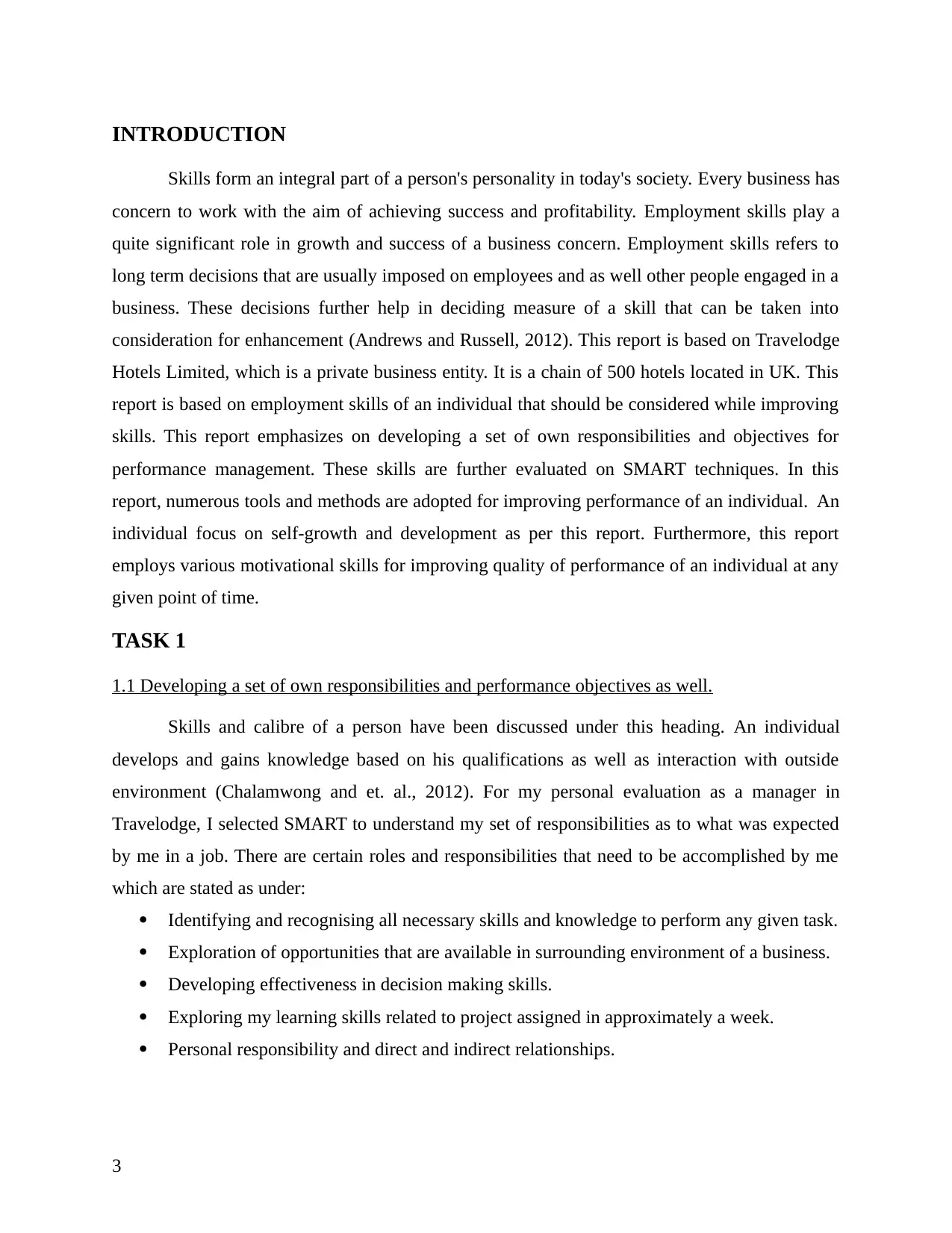
INTRODUCTION
Skills form an integral part of a person's personality in today's society. Every business has
concern to work with the aim of achieving success and profitability. Employment skills play a
quite significant role in growth and success of a business concern. Employment skills refers to
long term decisions that are usually imposed on employees and as well other people engaged in a
business. These decisions further help in deciding measure of a skill that can be taken into
consideration for enhancement (Andrews and Russell, 2012). This report is based on Travelodge
Hotels Limited, which is a private business entity. It is a chain of 500 hotels located in UK. This
report is based on employment skills of an individual that should be considered while improving
skills. This report emphasizes on developing a set of own responsibilities and objectives for
performance management. These skills are further evaluated on SMART techniques. In this
report, numerous tools and methods are adopted for improving performance of an individual. An
individual focus on self-growth and development as per this report. Furthermore, this report
employs various motivational skills for improving quality of performance of an individual at any
given point of time.
TASK 1
1.1 Developing a set of own responsibilities and performance objectives as well.
Skills and calibre of a person have been discussed under this heading. An individual
develops and gains knowledge based on his qualifications as well as interaction with outside
environment (Chalamwong and et. al., 2012). For my personal evaluation as a manager in
Travelodge, I selected SMART to understand my set of responsibilities as to what was expected
by me in a job. There are certain roles and responsibilities that need to be accomplished by me
which are stated as under:
Identifying and recognising all necessary skills and knowledge to perform any given task.
Exploration of opportunities that are available in surrounding environment of a business.
Developing effectiveness in decision making skills.
Exploring my learning skills related to project assigned in approximately a week.
Personal responsibility and direct and indirect relationships.
3
Skills form an integral part of a person's personality in today's society. Every business has
concern to work with the aim of achieving success and profitability. Employment skills play a
quite significant role in growth and success of a business concern. Employment skills refers to
long term decisions that are usually imposed on employees and as well other people engaged in a
business. These decisions further help in deciding measure of a skill that can be taken into
consideration for enhancement (Andrews and Russell, 2012). This report is based on Travelodge
Hotels Limited, which is a private business entity. It is a chain of 500 hotels located in UK. This
report is based on employment skills of an individual that should be considered while improving
skills. This report emphasizes on developing a set of own responsibilities and objectives for
performance management. These skills are further evaluated on SMART techniques. In this
report, numerous tools and methods are adopted for improving performance of an individual. An
individual focus on self-growth and development as per this report. Furthermore, this report
employs various motivational skills for improving quality of performance of an individual at any
given point of time.
TASK 1
1.1 Developing a set of own responsibilities and performance objectives as well.
Skills and calibre of a person have been discussed under this heading. An individual
develops and gains knowledge based on his qualifications as well as interaction with outside
environment (Chalamwong and et. al., 2012). For my personal evaluation as a manager in
Travelodge, I selected SMART to understand my set of responsibilities as to what was expected
by me in a job. There are certain roles and responsibilities that need to be accomplished by me
which are stated as under:
Identifying and recognising all necessary skills and knowledge to perform any given task.
Exploration of opportunities that are available in surrounding environment of a business.
Developing effectiveness in decision making skills.
Exploring my learning skills related to project assigned in approximately a week.
Personal responsibility and direct and indirect relationships.
3
⊘ This is a preview!⊘
Do you want full access?
Subscribe today to unlock all pages.

Trusted by 1+ million students worldwide
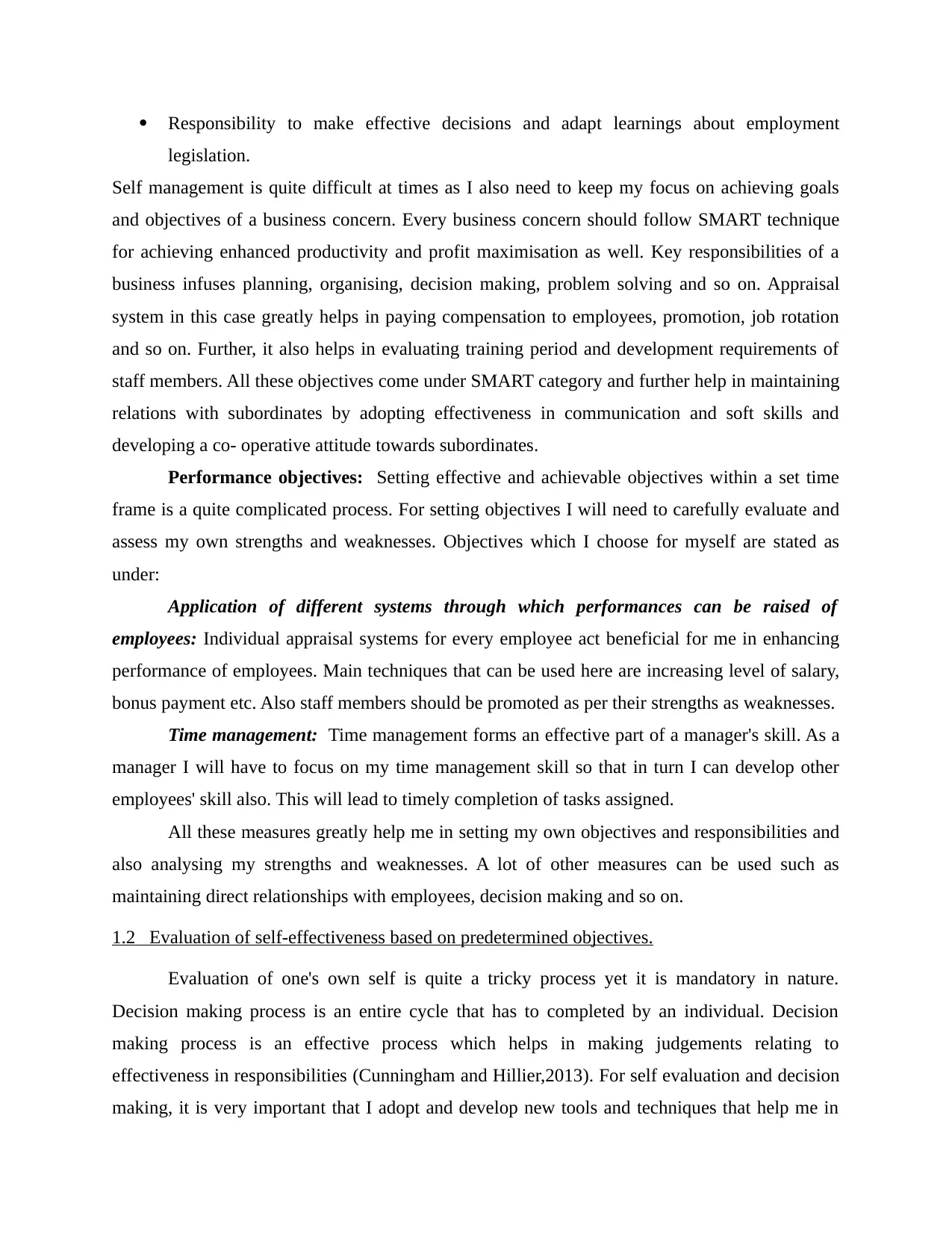
Responsibility to make effective decisions and adapt learnings about employment
legislation.
Self management is quite difficult at times as I also need to keep my focus on achieving goals
and objectives of a business concern. Every business concern should follow SMART technique
for achieving enhanced productivity and profit maximisation as well. Key responsibilities of a
business infuses planning, organising, decision making, problem solving and so on. Appraisal
system in this case greatly helps in paying compensation to employees, promotion, job rotation
and so on. Further, it also helps in evaluating training period and development requirements of
staff members. All these objectives come under SMART category and further help in maintaining
relations with subordinates by adopting effectiveness in communication and soft skills and
developing a co- operative attitude towards subordinates.
Performance objectives: Setting effective and achievable objectives within a set time
frame is a quite complicated process. For setting objectives I will need to carefully evaluate and
assess my own strengths and weaknesses. Objectives which I choose for myself are stated as
under:
Application of different systems through which performances can be raised of
employees: Individual appraisal systems for every employee act beneficial for me in enhancing
performance of employees. Main techniques that can be used here are increasing level of salary,
bonus payment etc. Also staff members should be promoted as per their strengths as weaknesses.
Time management: Time management forms an effective part of a manager's skill. As a
manager I will have to focus on my time management skill so that in turn I can develop other
employees' skill also. This will lead to timely completion of tasks assigned.
All these measures greatly help me in setting my own objectives and responsibilities and
also analysing my strengths and weaknesses. A lot of other measures can be used such as
maintaining direct relationships with employees, decision making and so on.
1.2 Evaluation of self-effectiveness based on predetermined objectives.
Evaluation of one's own self is quite a tricky process yet it is mandatory in nature.
Decision making process is an entire cycle that has to completed by an individual. Decision
making process is an effective process which helps in making judgements relating to
effectiveness in responsibilities (Cunningham and Hillier,2013). For self evaluation and decision
making, it is very important that I adopt and develop new tools and techniques that help me in
legislation.
Self management is quite difficult at times as I also need to keep my focus on achieving goals
and objectives of a business concern. Every business concern should follow SMART technique
for achieving enhanced productivity and profit maximisation as well. Key responsibilities of a
business infuses planning, organising, decision making, problem solving and so on. Appraisal
system in this case greatly helps in paying compensation to employees, promotion, job rotation
and so on. Further, it also helps in evaluating training period and development requirements of
staff members. All these objectives come under SMART category and further help in maintaining
relations with subordinates by adopting effectiveness in communication and soft skills and
developing a co- operative attitude towards subordinates.
Performance objectives: Setting effective and achievable objectives within a set time
frame is a quite complicated process. For setting objectives I will need to carefully evaluate and
assess my own strengths and weaknesses. Objectives which I choose for myself are stated as
under:
Application of different systems through which performances can be raised of
employees: Individual appraisal systems for every employee act beneficial for me in enhancing
performance of employees. Main techniques that can be used here are increasing level of salary,
bonus payment etc. Also staff members should be promoted as per their strengths as weaknesses.
Time management: Time management forms an effective part of a manager's skill. As a
manager I will have to focus on my time management skill so that in turn I can develop other
employees' skill also. This will lead to timely completion of tasks assigned.
All these measures greatly help me in setting my own objectives and responsibilities and
also analysing my strengths and weaknesses. A lot of other measures can be used such as
maintaining direct relationships with employees, decision making and so on.
1.2 Evaluation of self-effectiveness based on predetermined objectives.
Evaluation of one's own self is quite a tricky process yet it is mandatory in nature.
Decision making process is an entire cycle that has to completed by an individual. Decision
making process is an effective process which helps in making judgements relating to
effectiveness in responsibilities (Cunningham and Hillier,2013). For self evaluation and decision
making, it is very important that I adopt and develop new tools and techniques that help me in
Paraphrase This Document
Need a fresh take? Get an instant paraphrase of this document with our AI Paraphraser
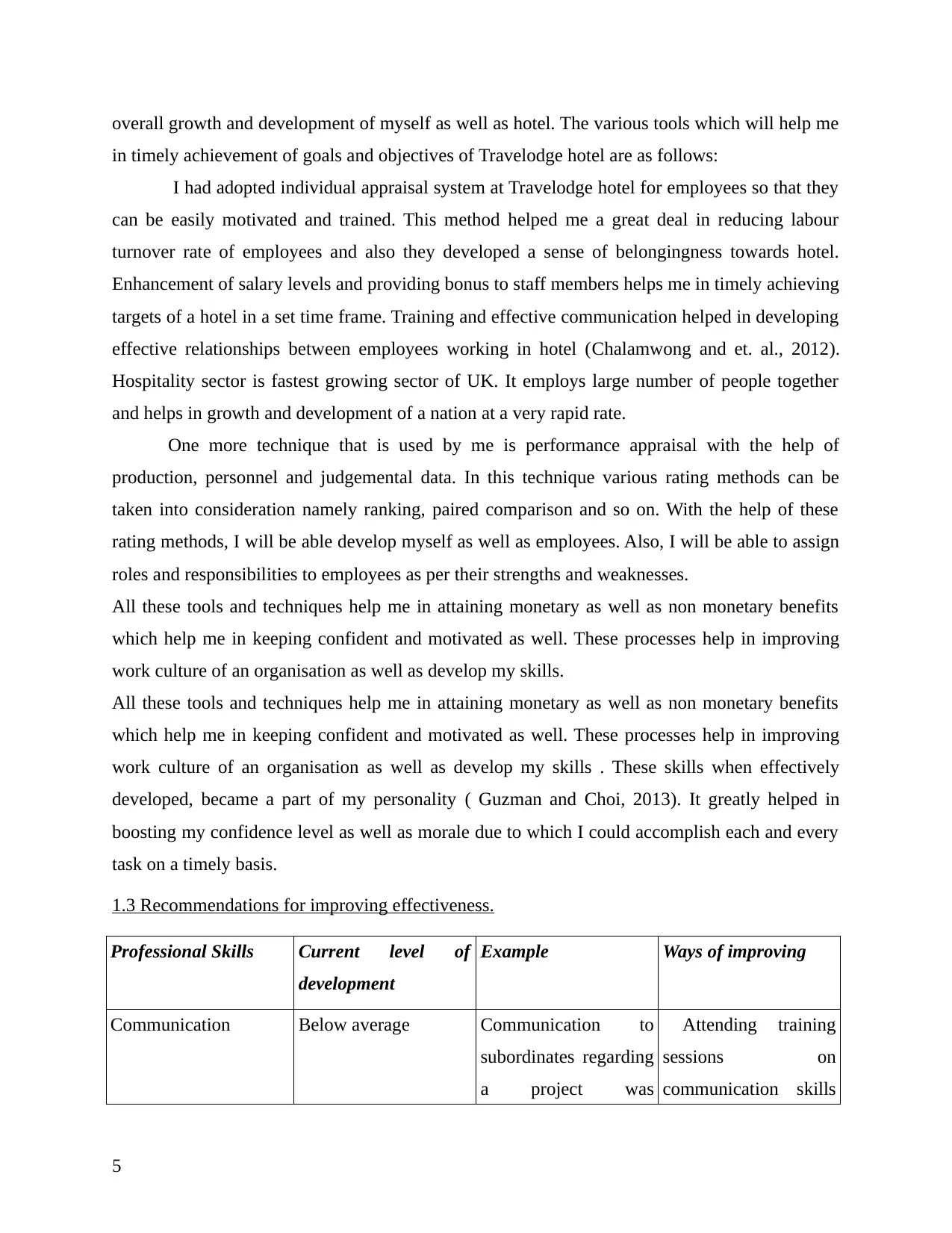
overall growth and development of myself as well as hotel. The various tools which will help me
in timely achievement of goals and objectives of Travelodge hotel are as follows:
I had adopted individual appraisal system at Travelodge hotel for employees so that they
can be easily motivated and trained. This method helped me a great deal in reducing labour
turnover rate of employees and also they developed a sense of belongingness towards hotel.
Enhancement of salary levels and providing bonus to staff members helps me in timely achieving
targets of a hotel in a set time frame. Training and effective communication helped in developing
effective relationships between employees working in hotel (Chalamwong and et. al., 2012).
Hospitality sector is fastest growing sector of UK. It employs large number of people together
and helps in growth and development of a nation at a very rapid rate.
One more technique that is used by me is performance appraisal with the help of
production, personnel and judgemental data. In this technique various rating methods can be
taken into consideration namely ranking, paired comparison and so on. With the help of these
rating methods, I will be able develop myself as well as employees. Also, I will be able to assign
roles and responsibilities to employees as per their strengths and weaknesses.
All these tools and techniques help me in attaining monetary as well as non monetary benefits
which help me in keeping confident and motivated as well. These processes help in improving
work culture of an organisation as well as develop my skills.
All these tools and techniques help me in attaining monetary as well as non monetary benefits
which help me in keeping confident and motivated as well. These processes help in improving
work culture of an organisation as well as develop my skills . These skills when effectively
developed, became a part of my personality ( Guzman and Choi, 2013). It greatly helped in
boosting my confidence level as well as morale due to which I could accomplish each and every
task on a timely basis.
1.3 Recommendations for improving effectiveness.
Professional Skills Current level of
development
Example Ways of improving
Communication Below average Communication to
subordinates regarding
a project was
Attending training
sessions on
communication skills
5
in timely achievement of goals and objectives of Travelodge hotel are as follows:
I had adopted individual appraisal system at Travelodge hotel for employees so that they
can be easily motivated and trained. This method helped me a great deal in reducing labour
turnover rate of employees and also they developed a sense of belongingness towards hotel.
Enhancement of salary levels and providing bonus to staff members helps me in timely achieving
targets of a hotel in a set time frame. Training and effective communication helped in developing
effective relationships between employees working in hotel (Chalamwong and et. al., 2012).
Hospitality sector is fastest growing sector of UK. It employs large number of people together
and helps in growth and development of a nation at a very rapid rate.
One more technique that is used by me is performance appraisal with the help of
production, personnel and judgemental data. In this technique various rating methods can be
taken into consideration namely ranking, paired comparison and so on. With the help of these
rating methods, I will be able develop myself as well as employees. Also, I will be able to assign
roles and responsibilities to employees as per their strengths and weaknesses.
All these tools and techniques help me in attaining monetary as well as non monetary benefits
which help me in keeping confident and motivated as well. These processes help in improving
work culture of an organisation as well as develop my skills.
All these tools and techniques help me in attaining monetary as well as non monetary benefits
which help me in keeping confident and motivated as well. These processes help in improving
work culture of an organisation as well as develop my skills . These skills when effectively
developed, became a part of my personality ( Guzman and Choi, 2013). It greatly helped in
boosting my confidence level as well as morale due to which I could accomplish each and every
task on a timely basis.
1.3 Recommendations for improving effectiveness.
Professional Skills Current level of
development
Example Ways of improving
Communication Below average Communication to
subordinates regarding
a project was
Attending training
sessions on
communication skills
5
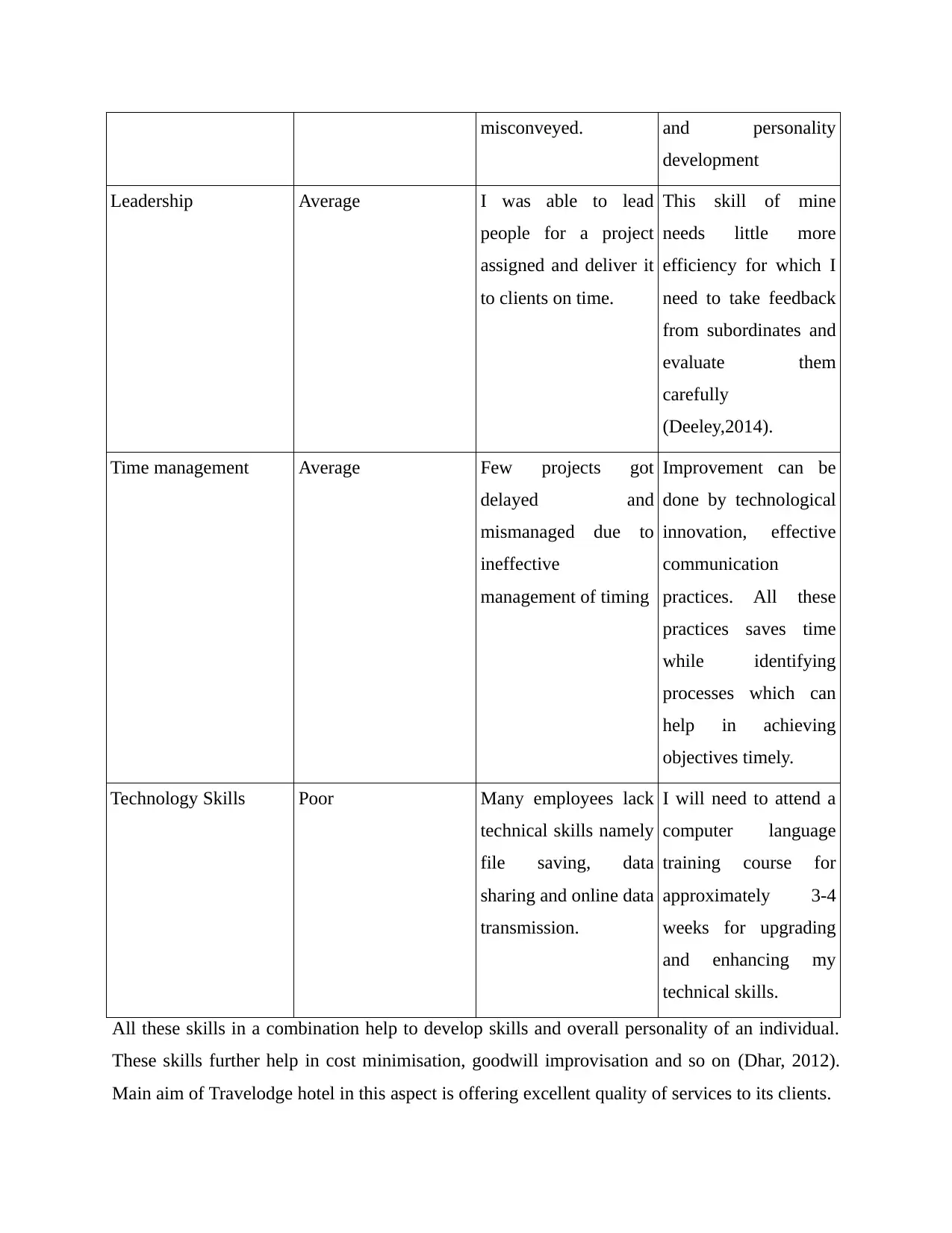
misconveyed. and personality
development
Leadership Average I was able to lead
people for a project
assigned and deliver it
to clients on time.
This skill of mine
needs little more
efficiency for which I
need to take feedback
from subordinates and
evaluate them
carefully
(Deeley,2014).
Time management Average Few projects got
delayed and
mismanaged due to
ineffective
management of timing
Improvement can be
done by technological
innovation, effective
communication
practices. All these
practices saves time
while identifying
processes which can
help in achieving
objectives timely.
Technology Skills Poor Many employees lack
technical skills namely
file saving, data
sharing and online data
transmission.
I will need to attend a
computer language
training course for
approximately 3-4
weeks for upgrading
and enhancing my
technical skills.
All these skills in a combination help to develop skills and overall personality of an individual.
These skills further help in cost minimisation, goodwill improvisation and so on (Dhar, 2012).
Main aim of Travelodge hotel in this aspect is offering excellent quality of services to its clients.
development
Leadership Average I was able to lead
people for a project
assigned and deliver it
to clients on time.
This skill of mine
needs little more
efficiency for which I
need to take feedback
from subordinates and
evaluate them
carefully
(Deeley,2014).
Time management Average Few projects got
delayed and
mismanaged due to
ineffective
management of timing
Improvement can be
done by technological
innovation, effective
communication
practices. All these
practices saves time
while identifying
processes which can
help in achieving
objectives timely.
Technology Skills Poor Many employees lack
technical skills namely
file saving, data
sharing and online data
transmission.
I will need to attend a
computer language
training course for
approximately 3-4
weeks for upgrading
and enhancing my
technical skills.
All these skills in a combination help to develop skills and overall personality of an individual.
These skills further help in cost minimisation, goodwill improvisation and so on (Dhar, 2012).
Main aim of Travelodge hotel in this aspect is offering excellent quality of services to its clients.
⊘ This is a preview!⊘
Do you want full access?
Subscribe today to unlock all pages.

Trusted by 1+ million students worldwide
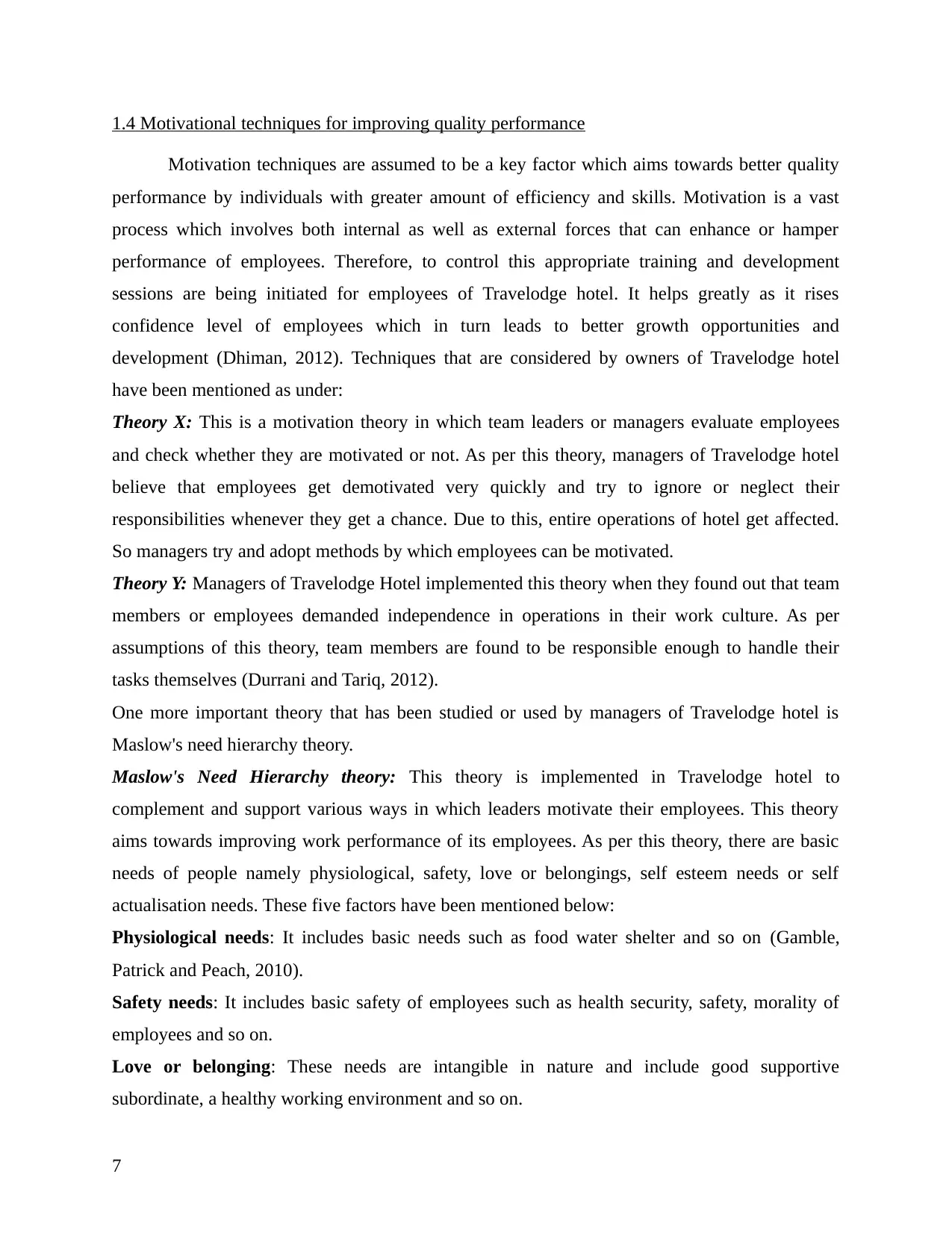
1.4 Motivational techniques for improving quality performance
Motivation techniques are assumed to be a key factor which aims towards better quality
performance by individuals with greater amount of efficiency and skills. Motivation is a vast
process which involves both internal as well as external forces that can enhance or hamper
performance of employees. Therefore, to control this appropriate training and development
sessions are being initiated for employees of Travelodge hotel. It helps greatly as it rises
confidence level of employees which in turn leads to better growth opportunities and
development (Dhiman, 2012). Techniques that are considered by owners of Travelodge hotel
have been mentioned as under:
Theory X: This is a motivation theory in which team leaders or managers evaluate employees
and check whether they are motivated or not. As per this theory, managers of Travelodge hotel
believe that employees get demotivated very quickly and try to ignore or neglect their
responsibilities whenever they get a chance. Due to this, entire operations of hotel get affected.
So managers try and adopt methods by which employees can be motivated.
Theory Y: Managers of Travelodge Hotel implemented this theory when they found out that team
members or employees demanded independence in operations in their work culture. As per
assumptions of this theory, team members are found to be responsible enough to handle their
tasks themselves (Durrani and Tariq, 2012).
One more important theory that has been studied or used by managers of Travelodge hotel is
Maslow's need hierarchy theory.
Maslow's Need Hierarchy theory: This theory is implemented in Travelodge hotel to
complement and support various ways in which leaders motivate their employees. This theory
aims towards improving work performance of its employees. As per this theory, there are basic
needs of people namely physiological, safety, love or belongings, self esteem needs or self
actualisation needs. These five factors have been mentioned below:
Physiological needs: It includes basic needs such as food water shelter and so on (Gamble,
Patrick and Peach, 2010).
Safety needs: It includes basic safety of employees such as health security, safety, morality of
employees and so on.
Love or belonging: These needs are intangible in nature and include good supportive
subordinate, a healthy working environment and so on.
7
Motivation techniques are assumed to be a key factor which aims towards better quality
performance by individuals with greater amount of efficiency and skills. Motivation is a vast
process which involves both internal as well as external forces that can enhance or hamper
performance of employees. Therefore, to control this appropriate training and development
sessions are being initiated for employees of Travelodge hotel. It helps greatly as it rises
confidence level of employees which in turn leads to better growth opportunities and
development (Dhiman, 2012). Techniques that are considered by owners of Travelodge hotel
have been mentioned as under:
Theory X: This is a motivation theory in which team leaders or managers evaluate employees
and check whether they are motivated or not. As per this theory, managers of Travelodge hotel
believe that employees get demotivated very quickly and try to ignore or neglect their
responsibilities whenever they get a chance. Due to this, entire operations of hotel get affected.
So managers try and adopt methods by which employees can be motivated.
Theory Y: Managers of Travelodge Hotel implemented this theory when they found out that team
members or employees demanded independence in operations in their work culture. As per
assumptions of this theory, team members are found to be responsible enough to handle their
tasks themselves (Durrani and Tariq, 2012).
One more important theory that has been studied or used by managers of Travelodge hotel is
Maslow's need hierarchy theory.
Maslow's Need Hierarchy theory: This theory is implemented in Travelodge hotel to
complement and support various ways in which leaders motivate their employees. This theory
aims towards improving work performance of its employees. As per this theory, there are basic
needs of people namely physiological, safety, love or belongings, self esteem needs or self
actualisation needs. These five factors have been mentioned below:
Physiological needs: It includes basic needs such as food water shelter and so on (Gamble,
Patrick and Peach, 2010).
Safety needs: It includes basic safety of employees such as health security, safety, morality of
employees and so on.
Love or belonging: These needs are intangible in nature and include good supportive
subordinate, a healthy working environment and so on.
7
Paraphrase This Document
Need a fresh take? Get an instant paraphrase of this document with our AI Paraphraser
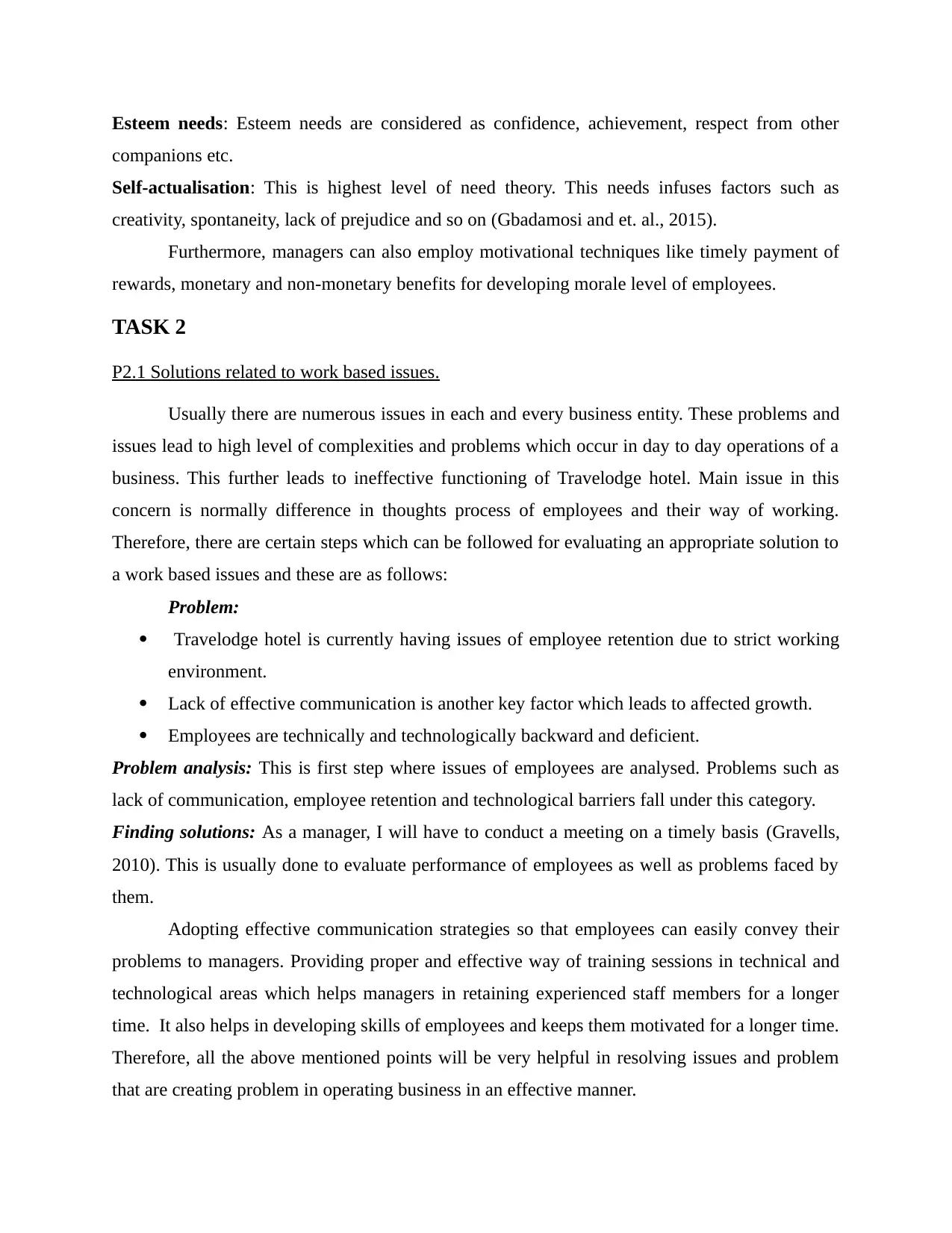
Esteem needs: Esteem needs are considered as confidence, achievement, respect from other
companions etc.
Self-actualisation: This is highest level of need theory. This needs infuses factors such as
creativity, spontaneity, lack of prejudice and so on (Gbadamosi and et. al., 2015).
Furthermore, managers can also employ motivational techniques like timely payment of
rewards, monetary and non-monetary benefits for developing morale level of employees.
TASK 2
P2.1 Solutions related to work based issues.
Usually there are numerous issues in each and every business entity. These problems and
issues lead to high level of complexities and problems which occur in day to day operations of a
business. This further leads to ineffective functioning of Travelodge hotel. Main issue in this
concern is normally difference in thoughts process of employees and their way of working.
Therefore, there are certain steps which can be followed for evaluating an appropriate solution to
a work based issues and these are as follows:
Problem:
Travelodge hotel is currently having issues of employee retention due to strict working
environment.
Lack of effective communication is another key factor which leads to affected growth.
Employees are technically and technologically backward and deficient.
Problem analysis: This is first step where issues of employees are analysed. Problems such as
lack of communication, employee retention and technological barriers fall under this category.
Finding solutions: As a manager, I will have to conduct a meeting on a timely basis (Gravells,
2010). This is usually done to evaluate performance of employees as well as problems faced by
them.
Adopting effective communication strategies so that employees can easily convey their
problems to managers. Providing proper and effective way of training sessions in technical and
technological areas which helps managers in retaining experienced staff members for a longer
time. It also helps in developing skills of employees and keeps them motivated for a longer time.
Therefore, all the above mentioned points will be very helpful in resolving issues and problem
that are creating problem in operating business in an effective manner.
companions etc.
Self-actualisation: This is highest level of need theory. This needs infuses factors such as
creativity, spontaneity, lack of prejudice and so on (Gbadamosi and et. al., 2015).
Furthermore, managers can also employ motivational techniques like timely payment of
rewards, monetary and non-monetary benefits for developing morale level of employees.
TASK 2
P2.1 Solutions related to work based issues.
Usually there are numerous issues in each and every business entity. These problems and
issues lead to high level of complexities and problems which occur in day to day operations of a
business. This further leads to ineffective functioning of Travelodge hotel. Main issue in this
concern is normally difference in thoughts process of employees and their way of working.
Therefore, there are certain steps which can be followed for evaluating an appropriate solution to
a work based issues and these are as follows:
Problem:
Travelodge hotel is currently having issues of employee retention due to strict working
environment.
Lack of effective communication is another key factor which leads to affected growth.
Employees are technically and technologically backward and deficient.
Problem analysis: This is first step where issues of employees are analysed. Problems such as
lack of communication, employee retention and technological barriers fall under this category.
Finding solutions: As a manager, I will have to conduct a meeting on a timely basis (Gravells,
2010). This is usually done to evaluate performance of employees as well as problems faced by
them.
Adopting effective communication strategies so that employees can easily convey their
problems to managers. Providing proper and effective way of training sessions in technical and
technological areas which helps managers in retaining experienced staff members for a longer
time. It also helps in developing skills of employees and keeps them motivated for a longer time.
Therefore, all the above mentioned points will be very helpful in resolving issues and problem
that are creating problem in operating business in an effective manner.
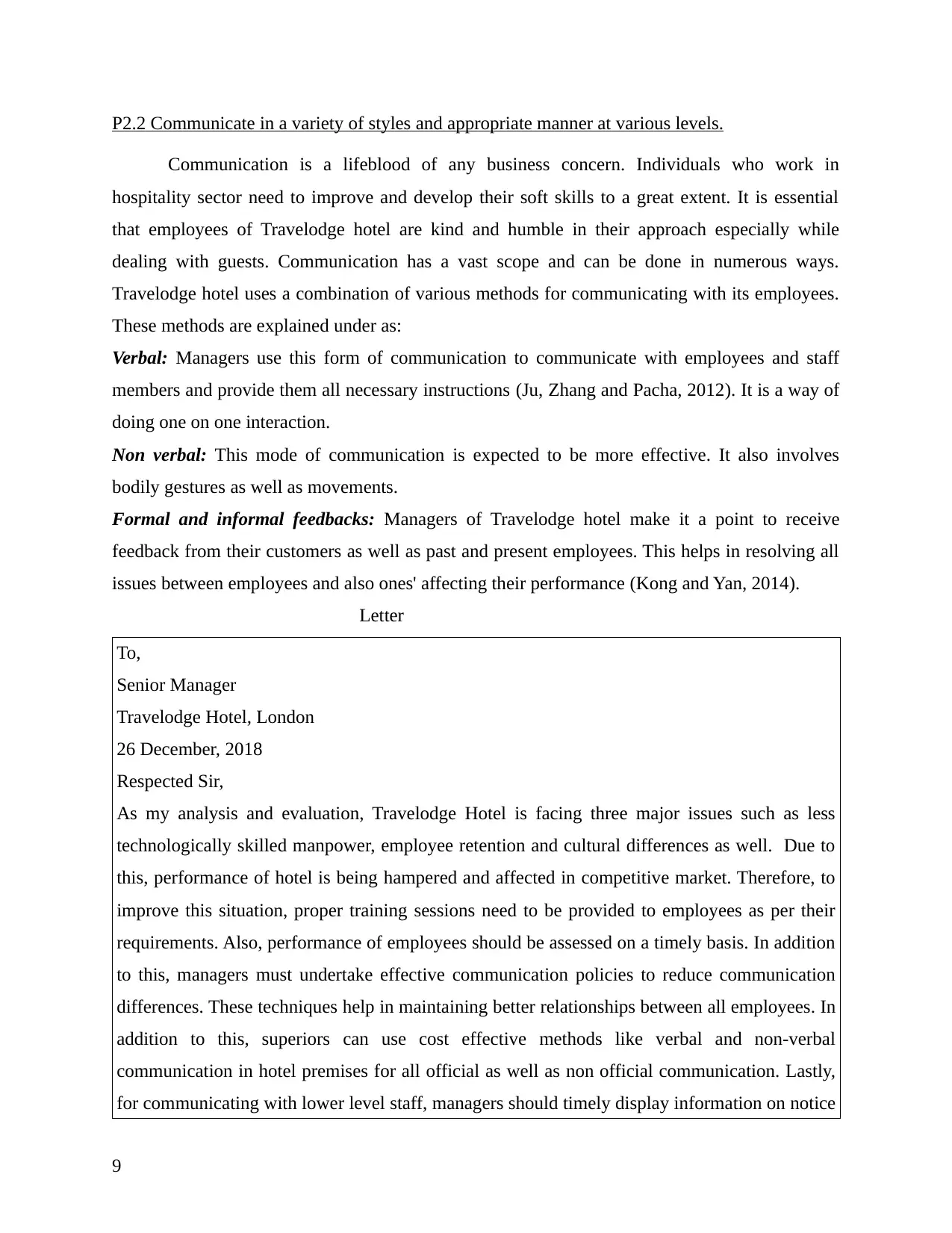
P2.2 Communicate in a variety of styles and appropriate manner at various levels.
Communication is a lifeblood of any business concern. Individuals who work in
hospitality sector need to improve and develop their soft skills to a great extent. It is essential
that employees of Travelodge hotel are kind and humble in their approach especially while
dealing with guests. Communication has a vast scope and can be done in numerous ways.
Travelodge hotel uses a combination of various methods for communicating with its employees.
These methods are explained under as:
Verbal: Managers use this form of communication to communicate with employees and staff
members and provide them all necessary instructions (Ju, Zhang and Pacha, 2012). It is a way of
doing one on one interaction.
Non verbal: This mode of communication is expected to be more effective. It also involves
bodily gestures as well as movements.
Formal and informal feedbacks: Managers of Travelodge hotel make it a point to receive
feedback from their customers as well as past and present employees. This helps in resolving all
issues between employees and also ones' affecting their performance (Kong and Yan, 2014).
Letter
To,
Senior Manager
Travelodge Hotel, London
26 December, 2018
Respected Sir,
As my analysis and evaluation, Travelodge Hotel is facing three major issues such as less
technologically skilled manpower, employee retention and cultural differences as well. Due to
this, performance of hotel is being hampered and affected in competitive market. Therefore, to
improve this situation, proper training sessions need to be provided to employees as per their
requirements. Also, performance of employees should be assessed on a timely basis. In addition
to this, managers must undertake effective communication policies to reduce communication
differences. These techniques help in maintaining better relationships between all employees. In
addition to this, superiors can use cost effective methods like verbal and non-verbal
communication in hotel premises for all official as well as non official communication. Lastly,
for communicating with lower level staff, managers should timely display information on notice
9
Communication is a lifeblood of any business concern. Individuals who work in
hospitality sector need to improve and develop their soft skills to a great extent. It is essential
that employees of Travelodge hotel are kind and humble in their approach especially while
dealing with guests. Communication has a vast scope and can be done in numerous ways.
Travelodge hotel uses a combination of various methods for communicating with its employees.
These methods are explained under as:
Verbal: Managers use this form of communication to communicate with employees and staff
members and provide them all necessary instructions (Ju, Zhang and Pacha, 2012). It is a way of
doing one on one interaction.
Non verbal: This mode of communication is expected to be more effective. It also involves
bodily gestures as well as movements.
Formal and informal feedbacks: Managers of Travelodge hotel make it a point to receive
feedback from their customers as well as past and present employees. This helps in resolving all
issues between employees and also ones' affecting their performance (Kong and Yan, 2014).
Letter
To,
Senior Manager
Travelodge Hotel, London
26 December, 2018
Respected Sir,
As my analysis and evaluation, Travelodge Hotel is facing three major issues such as less
technologically skilled manpower, employee retention and cultural differences as well. Due to
this, performance of hotel is being hampered and affected in competitive market. Therefore, to
improve this situation, proper training sessions need to be provided to employees as per their
requirements. Also, performance of employees should be assessed on a timely basis. In addition
to this, managers must undertake effective communication policies to reduce communication
differences. These techniques help in maintaining better relationships between all employees. In
addition to this, superiors can use cost effective methods like verbal and non-verbal
communication in hotel premises for all official as well as non official communication. Lastly,
for communicating with lower level staff, managers should timely display information on notice
9
⊘ This is a preview!⊘
Do you want full access?
Subscribe today to unlock all pages.

Trusted by 1+ million students worldwide
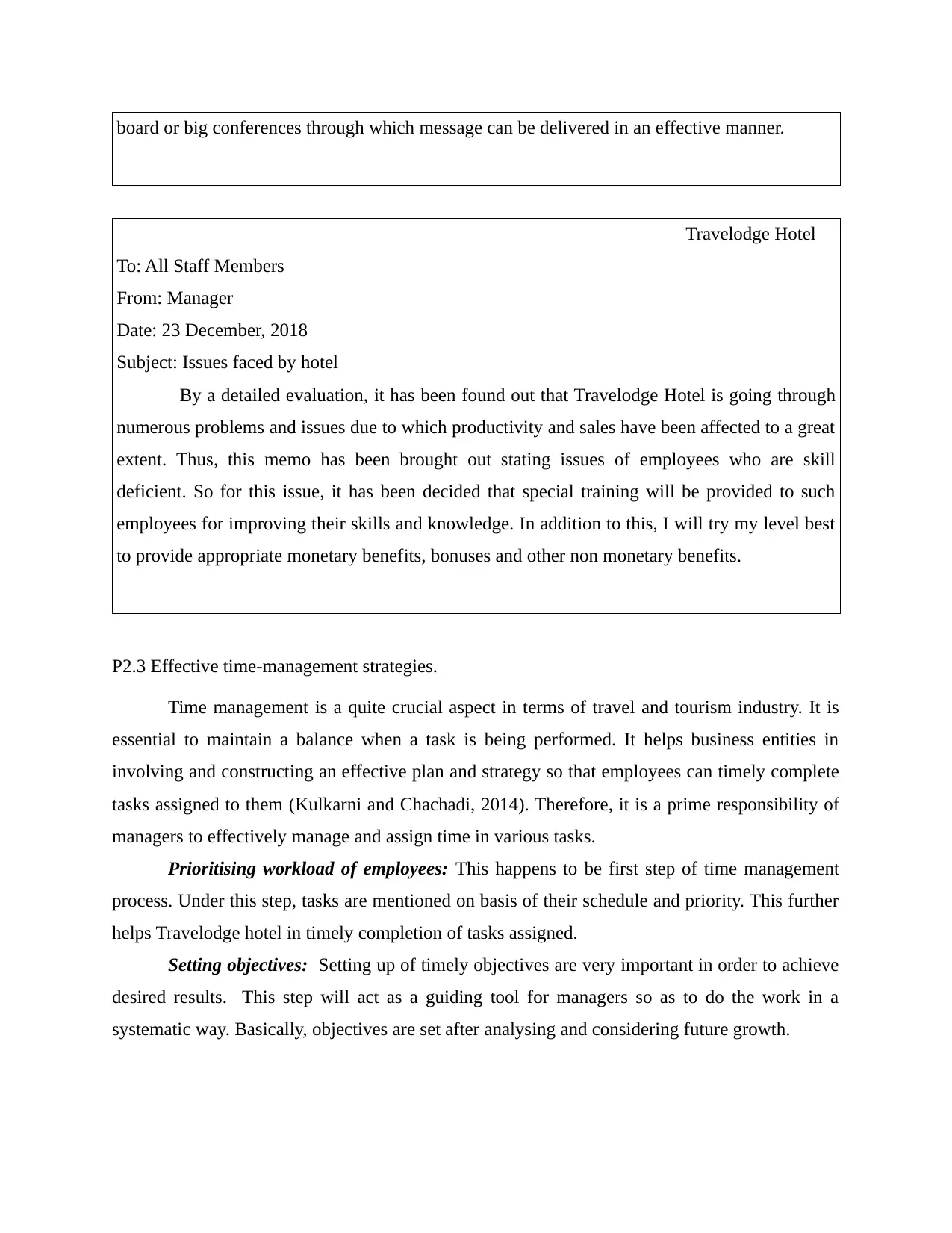
board or big conferences through which message can be delivered in an effective manner.
Travelodge Hotel
To: All Staff Members
From: Manager
Date: 23 December, 2018
Subject: Issues faced by hotel
By a detailed evaluation, it has been found out that Travelodge Hotel is going through
numerous problems and issues due to which productivity and sales have been affected to a great
extent. Thus, this memo has been brought out stating issues of employees who are skill
deficient. So for this issue, it has been decided that special training will be provided to such
employees for improving their skills and knowledge. In addition to this, I will try my level best
to provide appropriate monetary benefits, bonuses and other non monetary benefits.
P2.3 Effective time-management strategies.
Time management is a quite crucial aspect in terms of travel and tourism industry. It is
essential to maintain a balance when a task is being performed. It helps business entities in
involving and constructing an effective plan and strategy so that employees can timely complete
tasks assigned to them (Kulkarni and Chachadi, 2014). Therefore, it is a prime responsibility of
managers to effectively manage and assign time in various tasks.
Prioritising workload of employees: This happens to be first step of time management
process. Under this step, tasks are mentioned on basis of their schedule and priority. This further
helps Travelodge hotel in timely completion of tasks assigned.
Setting objectives: Setting up of timely objectives are very important in order to achieve
desired results. This step will act as a guiding tool for managers so as to do the work in a
systematic way. Basically, objectives are set after analysing and considering future growth.
Travelodge Hotel
To: All Staff Members
From: Manager
Date: 23 December, 2018
Subject: Issues faced by hotel
By a detailed evaluation, it has been found out that Travelodge Hotel is going through
numerous problems and issues due to which productivity and sales have been affected to a great
extent. Thus, this memo has been brought out stating issues of employees who are skill
deficient. So for this issue, it has been decided that special training will be provided to such
employees for improving their skills and knowledge. In addition to this, I will try my level best
to provide appropriate monetary benefits, bonuses and other non monetary benefits.
P2.3 Effective time-management strategies.
Time management is a quite crucial aspect in terms of travel and tourism industry. It is
essential to maintain a balance when a task is being performed. It helps business entities in
involving and constructing an effective plan and strategy so that employees can timely complete
tasks assigned to them (Kulkarni and Chachadi, 2014). Therefore, it is a prime responsibility of
managers to effectively manage and assign time in various tasks.
Prioritising workload of employees: This happens to be first step of time management
process. Under this step, tasks are mentioned on basis of their schedule and priority. This further
helps Travelodge hotel in timely completion of tasks assigned.
Setting objectives: Setting up of timely objectives are very important in order to achieve
desired results. This step will act as a guiding tool for managers so as to do the work in a
systematic way. Basically, objectives are set after analysing and considering future growth.
Paraphrase This Document
Need a fresh take? Get an instant paraphrase of this document with our AI Paraphraser
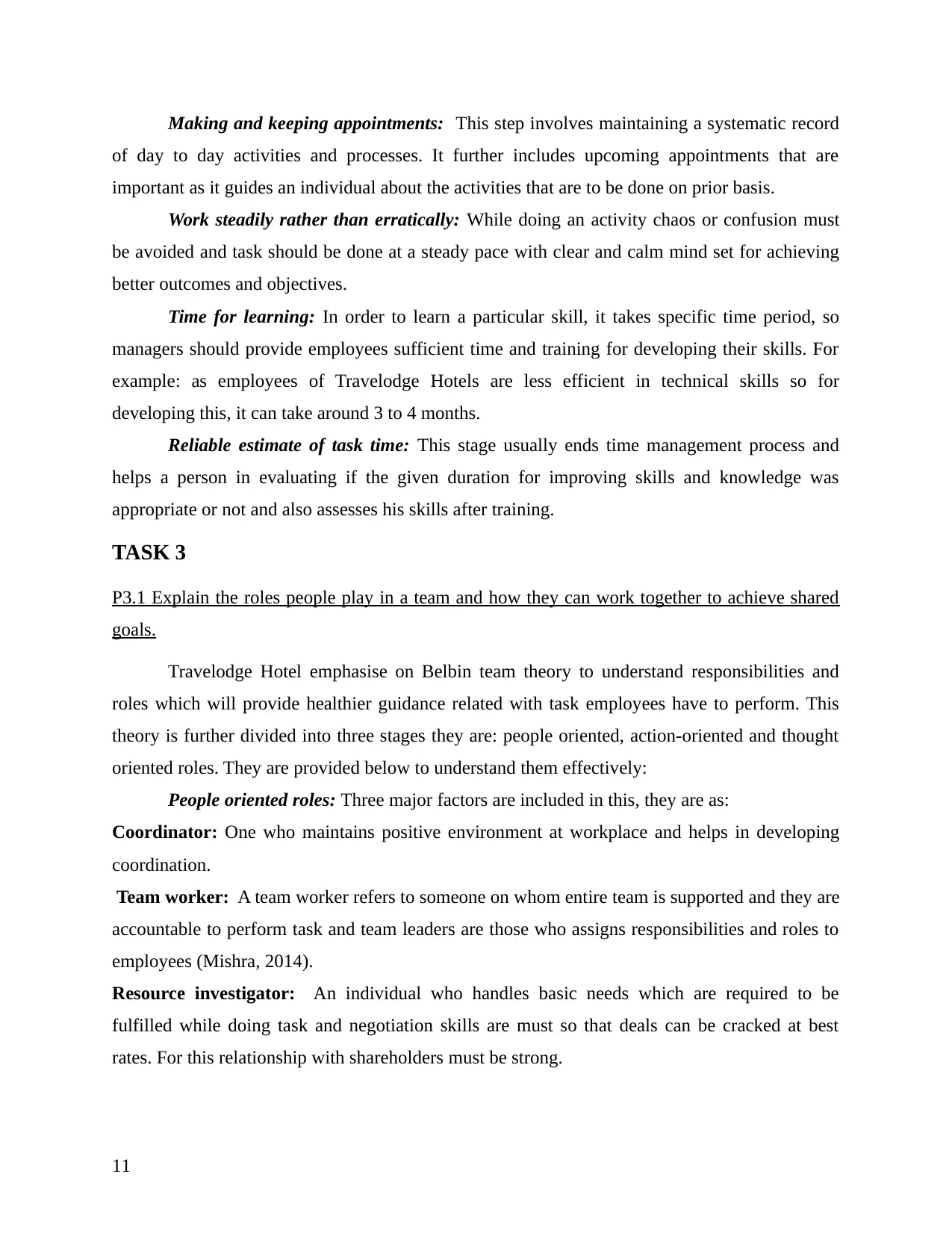
Making and keeping appointments: This step involves maintaining a systematic record
of day to day activities and processes. It further includes upcoming appointments that are
important as it guides an individual about the activities that are to be done on prior basis.
Work steadily rather than erratically: While doing an activity chaos or confusion must
be avoided and task should be done at a steady pace with clear and calm mind set for achieving
better outcomes and objectives.
Time for learning: In order to learn a particular skill, it takes specific time period, so
managers should provide employees sufficient time and training for developing their skills. For
example: as employees of Travelodge Hotels are less efficient in technical skills so for
developing this, it can take around 3 to 4 months.
Reliable estimate of task time: This stage usually ends time management process and
helps a person in evaluating if the given duration for improving skills and knowledge was
appropriate or not and also assesses his skills after training.
TASK 3
P3.1 Explain the roles people play in a team and how they can work together to achieve shared
goals.
Travelodge Hotel emphasise on Belbin team theory to understand responsibilities and
roles which will provide healthier guidance related with task employees have to perform. This
theory is further divided into three stages they are: people oriented, action-oriented and thought
oriented roles. They are provided below to understand them effectively:
People oriented roles: Three major factors are included in this, they are as:
Coordinator: One who maintains positive environment at workplace and helps in developing
coordination.
Team worker: A team worker refers to someone on whom entire team is supported and they are
accountable to perform task and team leaders are those who assigns responsibilities and roles to
employees (Mishra, 2014).
Resource investigator: An individual who handles basic needs which are required to be
fulfilled while doing task and negotiation skills are must so that deals can be cracked at best
rates. For this relationship with shareholders must be strong.
11
of day to day activities and processes. It further includes upcoming appointments that are
important as it guides an individual about the activities that are to be done on prior basis.
Work steadily rather than erratically: While doing an activity chaos or confusion must
be avoided and task should be done at a steady pace with clear and calm mind set for achieving
better outcomes and objectives.
Time for learning: In order to learn a particular skill, it takes specific time period, so
managers should provide employees sufficient time and training for developing their skills. For
example: as employees of Travelodge Hotels are less efficient in technical skills so for
developing this, it can take around 3 to 4 months.
Reliable estimate of task time: This stage usually ends time management process and
helps a person in evaluating if the given duration for improving skills and knowledge was
appropriate or not and also assesses his skills after training.
TASK 3
P3.1 Explain the roles people play in a team and how they can work together to achieve shared
goals.
Travelodge Hotel emphasise on Belbin team theory to understand responsibilities and
roles which will provide healthier guidance related with task employees have to perform. This
theory is further divided into three stages they are: people oriented, action-oriented and thought
oriented roles. They are provided below to understand them effectively:
People oriented roles: Three major factors are included in this, they are as:
Coordinator: One who maintains positive environment at workplace and helps in developing
coordination.
Team worker: A team worker refers to someone on whom entire team is supported and they are
accountable to perform task and team leaders are those who assigns responsibilities and roles to
employees (Mishra, 2014).
Resource investigator: An individual who handles basic needs which are required to be
fulfilled while doing task and negotiation skills are must so that deals can be cracked at best
rates. For this relationship with shareholders must be strong.
11
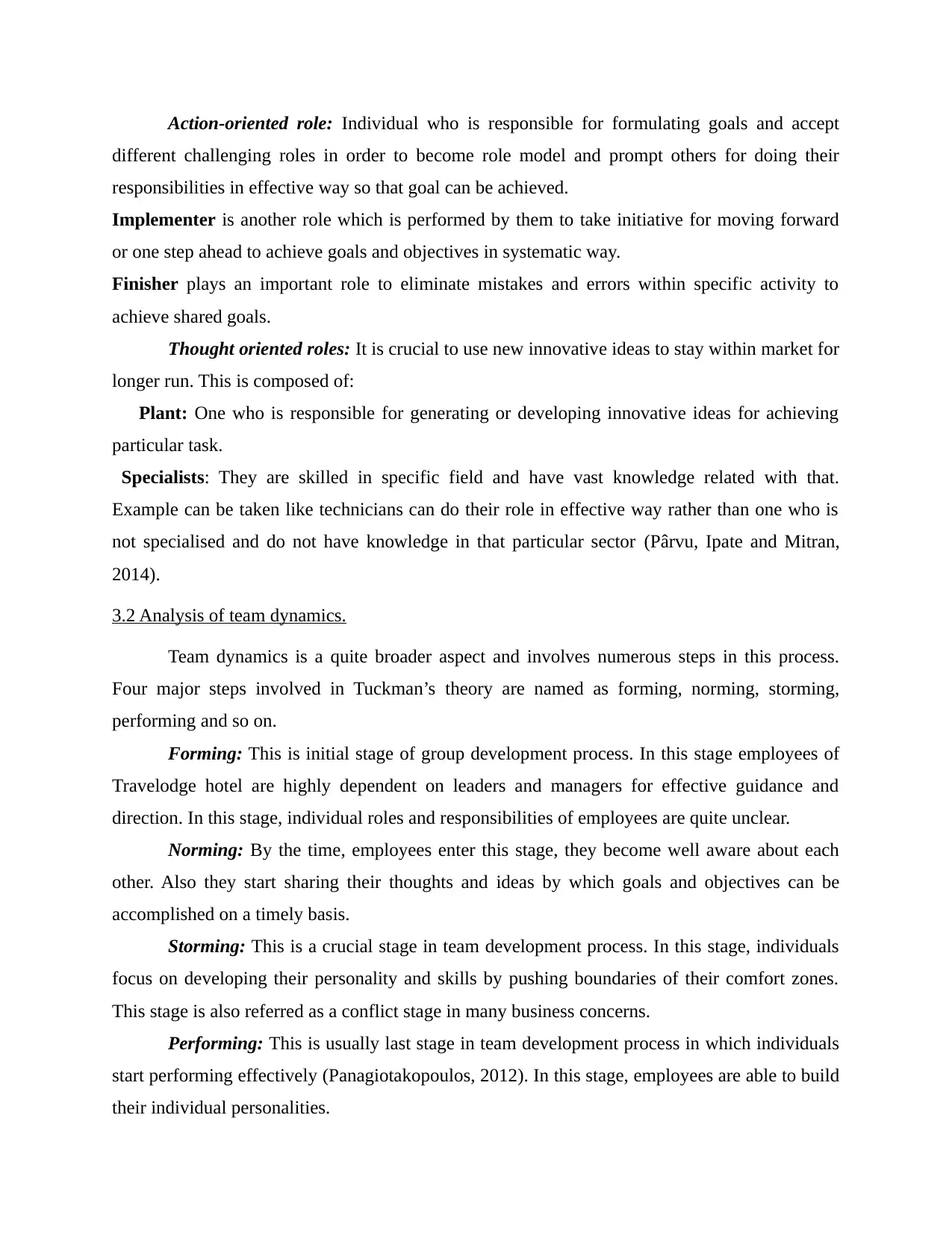
Action-oriented role: Individual who is responsible for formulating goals and accept
different challenging roles in order to become role model and prompt others for doing their
responsibilities in effective way so that goal can be achieved.
Implementer is another role which is performed by them to take initiative for moving forward
or one step ahead to achieve goals and objectives in systematic way.
Finisher plays an important role to eliminate mistakes and errors within specific activity to
achieve shared goals.
Thought oriented roles: It is crucial to use new innovative ideas to stay within market for
longer run. This is composed of:
Plant: One who is responsible for generating or developing innovative ideas for achieving
particular task.
Specialists: They are skilled in specific field and have vast knowledge related with that.
Example can be taken like technicians can do their role in effective way rather than one who is
not specialised and do not have knowledge in that particular sector (Pârvu, Ipate and Mitran,
2014).
3.2 Analysis of team dynamics.
Team dynamics is a quite broader aspect and involves numerous steps in this process.
Four major steps involved in Tuckman’s theory are named as forming, norming, storming,
performing and so on.
Forming: This is initial stage of group development process. In this stage employees of
Travelodge hotel are highly dependent on leaders and managers for effective guidance and
direction. In this stage, individual roles and responsibilities of employees are quite unclear.
Norming: By the time, employees enter this stage, they become well aware about each
other. Also they start sharing their thoughts and ideas by which goals and objectives can be
accomplished on a timely basis.
Storming: This is a crucial stage in team development process. In this stage, individuals
focus on developing their personality and skills by pushing boundaries of their comfort zones.
This stage is also referred as a conflict stage in many business concerns.
Performing: This is usually last stage in team development process in which individuals
start performing effectively (Panagiotakopoulos, 2012). In this stage, employees are able to build
their individual personalities.
different challenging roles in order to become role model and prompt others for doing their
responsibilities in effective way so that goal can be achieved.
Implementer is another role which is performed by them to take initiative for moving forward
or one step ahead to achieve goals and objectives in systematic way.
Finisher plays an important role to eliminate mistakes and errors within specific activity to
achieve shared goals.
Thought oriented roles: It is crucial to use new innovative ideas to stay within market for
longer run. This is composed of:
Plant: One who is responsible for generating or developing innovative ideas for achieving
particular task.
Specialists: They are skilled in specific field and have vast knowledge related with that.
Example can be taken like technicians can do their role in effective way rather than one who is
not specialised and do not have knowledge in that particular sector (Pârvu, Ipate and Mitran,
2014).
3.2 Analysis of team dynamics.
Team dynamics is a quite broader aspect and involves numerous steps in this process.
Four major steps involved in Tuckman’s theory are named as forming, norming, storming,
performing and so on.
Forming: This is initial stage of group development process. In this stage employees of
Travelodge hotel are highly dependent on leaders and managers for effective guidance and
direction. In this stage, individual roles and responsibilities of employees are quite unclear.
Norming: By the time, employees enter this stage, they become well aware about each
other. Also they start sharing their thoughts and ideas by which goals and objectives can be
accomplished on a timely basis.
Storming: This is a crucial stage in team development process. In this stage, individuals
focus on developing their personality and skills by pushing boundaries of their comfort zones.
This stage is also referred as a conflict stage in many business concerns.
Performing: This is usually last stage in team development process in which individuals
start performing effectively (Panagiotakopoulos, 2012). In this stage, employees are able to build
their individual personalities.
⊘ This is a preview!⊘
Do you want full access?
Subscribe today to unlock all pages.

Trusted by 1+ million students worldwide
1 out of 17
Related Documents
Your All-in-One AI-Powered Toolkit for Academic Success.
+13062052269
info@desklib.com
Available 24*7 on WhatsApp / Email
![[object Object]](/_next/static/media/star-bottom.7253800d.svg)
Unlock your academic potential
Copyright © 2020–2026 A2Z Services. All Rights Reserved. Developed and managed by ZUCOL.





